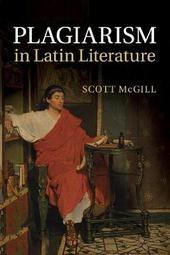
|
Plagiarism in Latin Literature
Paperback / softback
Main Details
| Title |
Plagiarism in Latin Literature
|
| Authors and Contributors |
By (author) Scott McGill
|
| Physical Properties |
| Format:Paperback / softback | | Pages:255 | | Dimensions(mm): Height 230,Width 155 |
|
| Category/Genre | Literary studies - classical, early and medieval |
|---|
| ISBN/Barcode |
9781108820172
|
| Classifications | Dewey:870.9 |
|---|
| Audience | | Professional & Vocational | |
|---|
|
Publishing Details |
| Publisher |
Cambridge University Press
|
| Imprint |
Cambridge University Press
|
| Publication Date |
17 September 2020 |
| Publication Country |
United Kingdom
|
Description
In response to critics who charged him with plagiarism, Virgil is said to have responded that it was easier to steal Hercules' club than a line from Homer. This was to deny the allegations by implying that Virgil was no plagiarist at all, but an author who had done the hard work of making Homer's material his own. Several other texts and passages in Latin literature provide further evidence for accusations and denials of plagiarism. Plagiarism in Latin Literature explores important questions such as, how do Roman writers and speakers define the practice? And how do the accusations and denials function? Scott McGill moves between varied sources, including Terence, Martial, Seneca the Elder and Macrobius' Virgil criticism to explore these questions. In the process, he offers new insights into the history of plagiarism and related issues, including Roman notions of literary property, authorship and textual reuse.
Author Biography
Scott McGill is currently interim director of the Humanities Research Center at Rice University. He is the author of Virgil Recomposed: The Mythological and Secular Virgilian Centos in Antiquity (2005) and co-editor of From the Tetrarchs to the Theodosians: Later Roman History and Culture, 284-450 CE (with Cristiana Sogno and Edward Watts, Cambridge University Press, 2010).
Reviews'McGill provides a valuable overview of the Romans' understanding of literary plagiarism and offers various definitions of the concept. Students of Latin literature will learn much from these pages, especially about the relationship of Latin literature to its illustrious Greek predecessor... After reading McGill's clear, thorough, and nuanced treatment, one not only understands more clearly this important topic but also appreciates the distinctive role it played in various genres and periods of Latin literature ... Highly recommended. Upper-division undergraduates through faculty, general readers, and professionals.' M. J. Johnson, Choice '[This book] significantly advances our awareness of the extent to which processes of textual creation were theorized and explicated by Roman authors.' Joseph A. Howley, Language and Literature
|